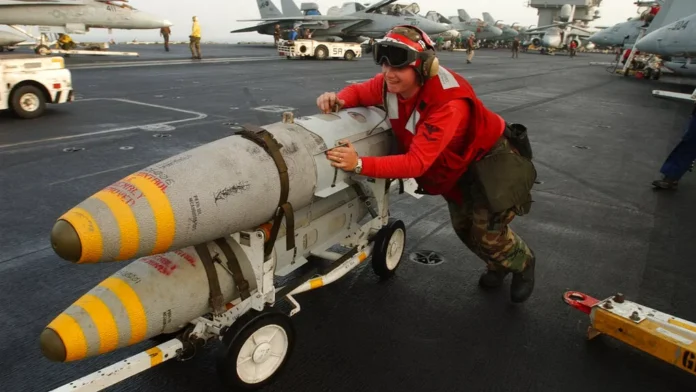Written by Lisa Murimi
The United States has approved the sale of $346 million worth of munitions, precision rockets, and other advanced weaponry to Nigeria, in a move framed as bolstering a key strategic partner in West Africa against the rising tide of terrorist violence.
According to a U.S. State Department statement released Wednesday, the transaction aligns with Washington’s foreign policy objective of reinforcing the security capacity of allies in Sub-Saharan Africa.
“The proposed sale will improve Nigeria’s capability to meet current and future threats through operations against terrorist organisations and to counter illicit trafficking in Nigeria and the Gulf of Guinea,” the statement read.
The Nigerian government’s request includes over a thousand MK-82 500-pound bombs — a type most recently used in the Israel–Gaza conflict — along with 5,000 precision rocket Kill Weapon Systems (APKWS), laser-guided bomb kits, high-explosive rockets, and a package of technical personnel services.
Nigeria has been battling sustained insurgencies by Boko Haram and Islamic State West Africa Province (ISWAP) in its northern regions, with both groups responsible for mass killings, abductions, and the displacement of millions.
The violence has not only destabilised rural communities but also threatened regional security, complicating economic and humanitarian operations in the Lake Chad Basin.
The Nigerian Air Force, under Chief of Air Staff Hasan Abubakar, has intensified aerial operations in Borno State — the epicentre of the insurgency — reporting the elimination of 592 terrorists over the past eight months.
“This year, our air campaign is quicker, more precise, and more surgical,” Abubakar stated. “We are eliminating high-value targets, crippling logistics networks, and dismantling cells that threaten peace in the northeast.”
From a diplomatic perspective, the arms sale highlights Washington’s enduring interest in Nigeria as both an economic hub and security anchor in West Africa.
Nigeria’s role as the continent’s largest economy and a leading troop contributor to regional peacekeeping missions makes its stability a strategic imperative for U.S.–Africa policy.
However, the deal also raises questions among human rights observers. The inclusion of MK-82 bombs — associated with civilian casualties in other conflict zones — has drawn cautious scrutiny over the potential humanitarian risks in densely populated areas of Nigeria’s northeast.
Analysts note that while precision-guided munitions could reduce collateral damage, their use requires strict adherence to international humanitarian law to avoid exacerbating civilian suffering.
For Nigeria, the agreement represents a significant upgrade in counter-terrorism capabilities at a time when extremist groups are adapting to military pressure by dispersing into harder-to-reach areas and expanding criminal activities such as arms trafficking and illegal mining.
The U.S. delivery could enhance Nigeria’s ability to conduct targeted strikes, improve border security, and safeguard maritime routes in the Gulf of Guinea.
With the arms transfer pending Congressional approval, the deal will be closely watched in both Abuja and Washington.
If cleared, it could mark a deepening phase of U.S.–Nigeria security cooperation — one that will test how military assistance can be balanced with human rights considerations in a volatile counter-insurgency theatre.



















